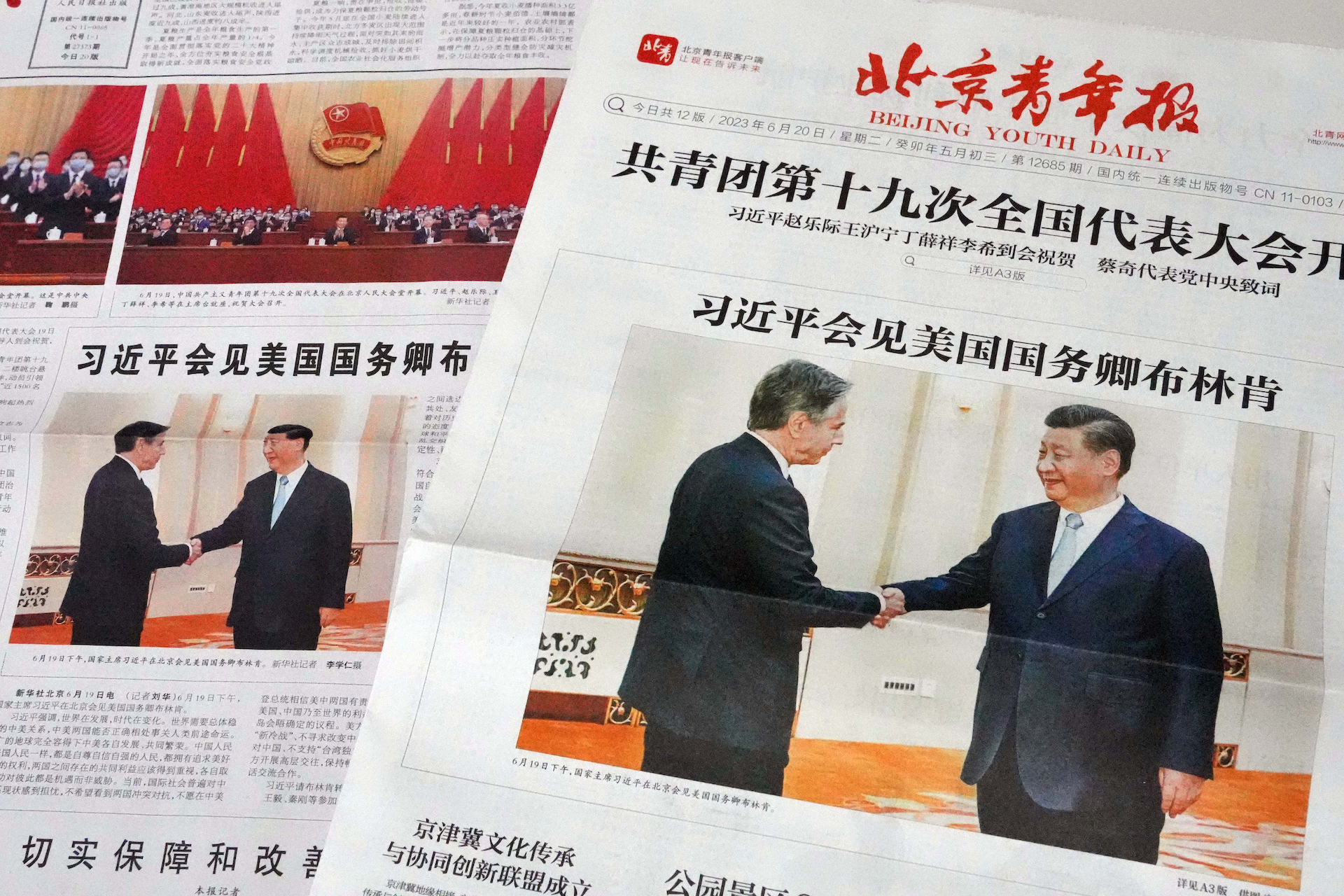Xi met with Blinken, Li courts German businesses, Modi to visit the U.S.
Chinese leader Xi Jinping met with U.S. Secretary of State Antony Blinken in Beijing yesterday, in a bid to stabilize ties between the two superpowers. Meanwhile, China’s No. 2 official is in Berlin on a trip aimed at smoothing things over with Europe’s economic powerhouse.

Chinese leader Xí Jìnpíng 习近平 met with U.S. Secretary of State Antony Blinken in Beijing on June 19 (readout from Beijing, Washington), in the highest-level meeting between American and Chinese officials since U.S. President Joe Biden took office in 2021.
While the meeting yielded no breakthroughs on their most sensitive issues, the two sides made “progress” toward steering relations back on track and agreed on the need to “stabilize” the bilateral relationship.
“The two countries should act with a sense of responsibility for history, for the people, and for the world, and handle China-U.S. relations properly,” Xi said. “In this way, they may contribute to global peace and development, and help make the world, which is changing and turbulent, more stable, certain, and constructive.”
Blinken stressed that their two governments should “maintain open channels of communication…to reduce the risk of miscalculation,” while adding that the U.S. “will responsibly manage that competition so that the relationship does not veer into conflict.”
Prior to his meeting with Xi, Blinken spoke with Chinese Foreign Minister Qín Gāng 秦刚 (readout from Beijing, Washington) and a slew of other senior Chinese officials, in an extensive effort to resume high-level engagement between the two governments at a time of growing mistrust.
Blinken, who wrapped up a two-day trip to China, is the first in his position to visit Beijing since 2018. Earlier plans for his highly anticipated visit were postponed after an alleged Chinese spy balloon was downed by the U.S. Department of Defense in February. The fallout had intensified already fraught ties between the two superpowers over China’s increasing military activity around Taiwan and the South China Sea, as well as Beijing’s refusal to condemn Russia over its invasion of Ukraine.
Li Qiang in Germany
Meanwhile, China’s Premier Lǐ Qiáng 李强 met with German President Frank-Walter Steinmeier in Berlin yesterday. Li, who will visit Germany and France from June 18 to 23, is on his first trip abroad since taking office as China’s No. 2 official in March.
“Enterprises have the most direct and acute sense of risk and know how to avoid and respond to it,” Li said to a room full of German business representatives today. “Failure to cooperate is the biggest risk, and failure to develop is the biggest insecurity.”
He also urged all parties against “exaggerating the degree of dependence” or “equating interdependence with insecurity.”
Later today, Li and a large delegation of Chinese officials will meet with German Chancellor Olaf Scholz and other German counterparts, in a bid to shore up ties with Europe’s economic powerhouse.
Just last week on June 14, Germany published its first national security strategy, the first since the end of World War II. The blueprint labeled China as “a partner, competitor, and systemic rival,” but at the same time, noted that China “remains a partner without whom many global challenges and crises cannot be resolved.”
Chinese Foreign Ministry spokesperson Wāng Wénbīn 汪文斌 urged for “mutually beneficial cooperation” and “an open and inclusive mindset” when asked about Germany’s new strategy on June 15.
Compared with other EU members, Germany has often led a more pragmatic approach when it comes to China, its largest trading partner. But relations have been strained over Beijing’s alignment with Moscow over its war in Ukraine, as well as growing calls led by the U.S. to “de-risk” strategic industries from the Chinese economy.
Scholz, in particular, has been criticized both in Germany and among members of the EU for being too conciliatory toward China, at a time when many of his peers have advocated for a tougher stance on things like energy dependency or sensitive technology.
The context: A busy fortnight of business and security diplomacy
Li’s trip comes after a series of meetings in Beijing between top Communist Party officials and foreign entrepreneurial heavyweights: Xi welcomed Bill Gates as “the first American friend” he has met with this year in Beijing during their meeting on June 16. Just a few weeks prior, Elon Musk, the CEO of Tesla and SpaceX, and Jamie Dimon, the head of JPMorgan Chase, paid similar high-level trips to China, though neither of them met with Xi.
Both Li’s and Blinken’s trips follow a visit by U.S. National Security Advisor Jake Sullivan to Japan, where he met “bilaterally with his national security advisor counterparts Akiba Takeo of Japan, Cho Tae-yong of the ROK, and Eduardo Ano of the Philippines, where he discussed efforts to strengthen bilateral cooperation and reaffirmed the United States’ ironclad alliance commitments.” Sullivan also met with Japanese Prime Minister Fumio Kishida.
This week, Indian Prime Minister Narendra Modi will pay a state visit to the U.S. from June 21 to 25, during which he is scheduled to meet Joe Biden.






